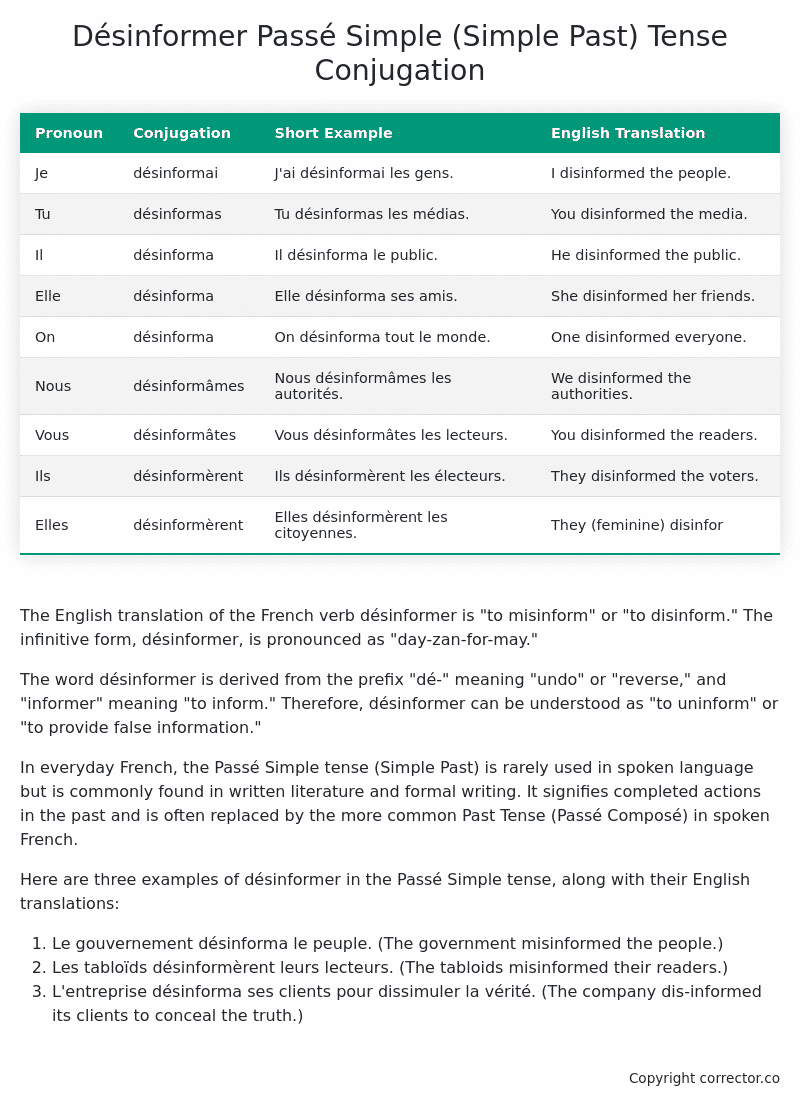Passé Simple (Simple Past) Tense Conjugation of the French Verb désinformer
Introduction to the verb désinformer
The English translation of the French verb désinformer is “to misinform” or “to disinform.” The infinitive form, désinformer, is pronounced as “day-zan-for-may.”
The word désinformer is derived from the prefix “dé-” meaning “undo” or “reverse,” and “informer” meaning “to inform.” Therefore, désinformer can be understood as “to uninform” or “to provide false information.”
In everyday French, the Passé Simple tense (Simple Past) is rarely used in spoken language but is commonly found in written literature and formal writing. It signifies completed actions in the past and is often replaced by the more common Past Tense (Passé Composé) in spoken French.
Here are three examples of désinformer in the Passé Simple tense, along with their English translations:
- Le gouvernement désinforma le peuple. (The government misinformed the people.)
- Les tabloïds désinformèrent leurs lecteurs. (The tabloids misinformed their readers.)
- L’entreprise désinforma ses clients pour dissimuler la vérité. (The company dis-informed its clients to conceal the truth.)
Table of the Passé Simple (Simple Past) Tense Conjugation of désinformer
| Pronoun | Conjugation | Short Example | English Translation |
|---|---|---|---|
| Je | désinformai | J’ai désinformai les gens. | I disinformed the people. |
| Tu | désinformas | Tu désinformas les médias. | You disinformed the media. |
| Il | désinforma | Il désinforma le public. | He disinformed the public. |
| Elle | désinforma | Elle désinforma ses amis. | She disinformed her friends. |
| On | désinforma | On désinforma tout le monde. | One disinformed everyone. |
| Nous | désinformâmes | Nous désinformâmes les autorités. | We disinformed the authorities. |
| Vous | désinformâtes | Vous désinformâtes les lecteurs. | You disinformed the readers. |
| Ils | désinformèrent | Ils désinformèrent les électeurs. | They disinformed the voters. |
| Elles | désinformèrent | Elles désinformèrent les citoyennes. | They (feminine) disinfor |
Other Conjugations for Désinformer.
Le Present (Present Tense) Conjugation of the French Verb désinformer
Imparfait (Imperfect) Tense Conjugation of the French Verb désinformer
Passé Simple (Simple Past) Tense Conjugation of the French Verb désinformer (You’re reading it right now!)
Passé Composé (Present Perfect) Tense Conjugation of the French Verb désinformer
Futur Simple (Simple Future) Tense Conjugation of the French Verb désinformer
Futur Proche (Near Future) Tense Conjugation of the French Verb désinformer
Plus-que-parfait (Pluperfect) Tense Conjugation of the French Verb désinformer
Passé Antérieur (Past Anterior) Tense Conjugation of the French Verb désinformer
Futur Antérieur (Future Anterior) Tense Conjugation of the French Verb désinformer
Subjonctif Présent (Subjunctive Present) Tense Conjugation of the French Verb désinformer
Subjonctif Passé (Subjunctive Past) Tense Conjugation of the French Verb désinformer
Subjonctif Imparfait (Subjunctive Imperfect) Tense Conjugation of the French Verb désinformer
Conditionnel Présent (Conditional Present) Tense Conjugation of the French Verb désinformer
Conditionnel Passé (Conditional Past) Tense Conjugation of the French Verb désinformer
Conditionnel Passé II (Conditional Past II) Tense Conjugation of the French Verb désinformer
L’impératif Présent (Imperative Present) Tense Conjugation of the French Verb désinformer
L’impératif Passé (Imperative Past) Tense Conjugation of the French Verb désinformer
L’infinitif Présent (Infinitive Present) Tense Conjugation of the French Verb désinformer
L’infinitif Passé (Infinitive Past) Tense Conjugation of the French Verb désinformer
Le Participe Présent (Present Participle) Tense Conjugation of the French Verb désinformer
Le Participe Passé (Past Participle) Tense Conjugation of the French Verb désinformer
Struggling with French verbs or the language in general? Why not use our free French Grammar Checker – no registration required!
Get a FREE Download Study Sheet of this Conjugation 🔥
Simply right click the image below, click “save image” and get your free reference for the désinformer Passé Simple tense conjugation!

Désinformer – About the French Passé Simple (Simple Past) Tense
Formation
Usage
Narration
Historical Context
Interactions with other tenses
Passé Composé
Imparfait
Conditional and Subjunctive
Summary
I hope you enjoyed this article on the verb désinformer. Still in a learning mood? Check out another TOTALLY random French verb conjugation!


